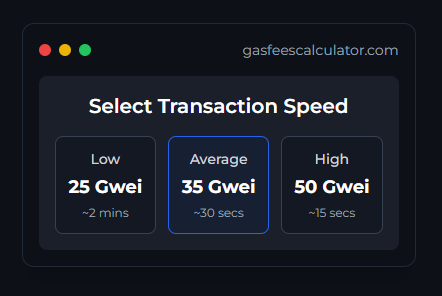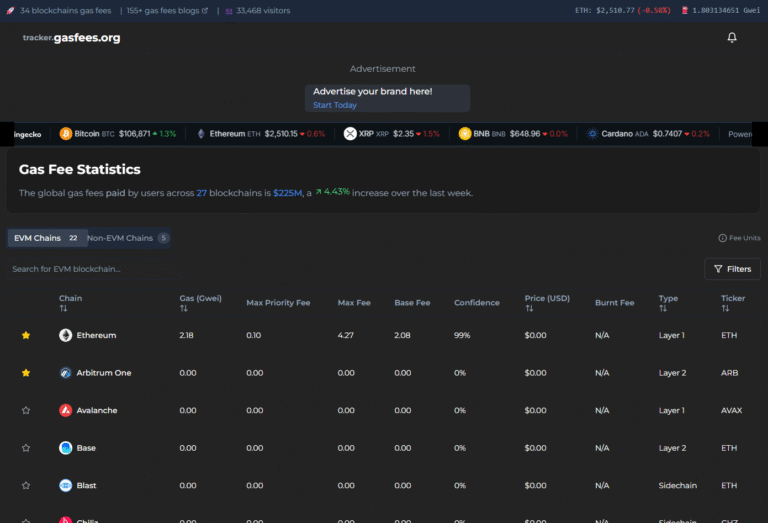Understanding Gas Fees: The Basics
This guide breaks down what gas fees are, how they’re calculated, and how you can track and reduce them using real-time tools on GasFees.org.
Understanding Gas Fees: The Basics
Gas fees are a fundamental component of blockchain networks, particularly Ethereum. They represent the cost required to perform operations, such as executing transactions or deploying smart contracts, on the blockchain. Understanding how gas fees work is essential for anyone interacting with decentralized applications (dApps) or conducting cryptocurrency transactions.(Nervos Network, D’CENT Shop)
What Are Gas Fees?
In blockchain networks like Ethereum, gas fees are payments made by users to compensate for the computational energy required to process and validate transactions. These fees are paid in the network’s native cryptocurrency—ETH for Ethereum—and are denominated in smaller units called gwei (1 ETH = 1,000,000,000 gwei).(Nervos Network)
Gas fees serve two primary purposes:(Uniswap Labs)
- Incentivizing Validators: Validators (or miners, in proof-of-work systems) receive gas fees as a reward for including transactions in the blockchain. This incentivizes them to maintain the network’s security and integrity.(Uniswap Labs)
- Preventing Spam: By associating a cost with each transaction, gas fees deter malicious actors from overwhelming the network with unnecessary operations.(Coinbase)
How Are Gas Fees Calculated?
The total gas fee for a transaction is determined by two factors:
- Gas Limit: The maximum amount of gas a user is willing to consume for a transaction. Different operations require varying amounts of gas. For example, a simple ETH transfer might require 21,000 gas units, while interacting with a complex smart contract could demand significantly more.
- Gas Price: The amount a user is willing to pay per unit of gas, typically measured in gwei. Users can set higher gas prices to prioritize their transactions during times of network congestion.(D’CENT Shop)
Total Gas Fee = Gas Limit × Gas Price
For instance, if you set a gas limit of 21,000 and a gas price of 50 gwei, the total fee would be:
21,000 × 50 gwei = 1,050,000 gwei = 0.00105 ETH
Factors Influencing Gas Fees
Several elements can impact gas fees:
- Network Congestion: High demand for transactions can lead to increased gas prices as users compete to have their transactions processed promptly.(D’CENT Shop)
- Transaction Complexity: More complex operations, such as executing smart contracts or interacting with dApps, consume more gas.(D’CENT Shop)
- Base Fee and Tips: Ethereum’s fee structure includes a base fee (which is burned) and an optional tip to incentivize validators. Users can add a tip to expedite their transactions.(Wikipedia)
Real-Time Gas Fee Tracking
Monitoring current gas prices can help users decide the optimal time to execute transactions. Tools like Etherscan’s Gas Tracker provide real-time data on gas fees, including:
- Low: Suitable for non-urgent transactions.(D’CENT Shop)
- Average: Standard rate for typical transactions.
- High: For urgent transactions requiring immediate processing.
Strategies to Reduce Gas Fees
To minimize gas fees:
- Transact During Off-Peak Hours: Network congestion often decreases during weekends or late-night hours (UTC), leading to lower gas prices.(D’CENT Shop)
- Use Layer 2 Solutions: Platforms like Arbitrum, Optimism, and Polygon offer faster and cheaper transactions by processing them off the main Ethereum chain.
- Optimize Smart Contracts: Efficient coding practices can reduce the gas required for contract execution.
- Set Appropriate Gas Limits: Avoid overestimating the gas limit to prevent unnecessary costs.
Conclusion
Gas fees are an integral part of blockchain operations, ensuring network security and efficiency. By understanding how they work and the factors influencing them, users can make informed decisions, optimize their transactions, and potentially save on costs.
For more insights and tools to monitor gas fees across various blockchains, visit GasFees.org.




